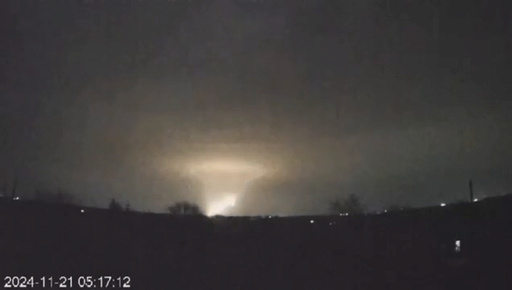Estimating super-sonic missile velocity in the atmosphere
Estimating super-sonic missile velocity in the atmosphere
In this article, you will read how we can estimate the velocity of the missile flying in the atmosphere with a velocity higher than the sounds of speed. For this, I will use Python scripts, which can be used for any similar calculations.
Super- or hyper- sonic rocket
Recently Russia used an intermediate-range ballistic missile with its reported speed exceeding Mach 10 (12,300 km/h; 7,610 mph; 3.40 km/s). The missile is equipped with six warheads with submunition. We have only video of the landing of this missile and it is necessary to estimate the velocity of these warheads.
 video with the landing of the first warhead of Oreshnick, claimed to be hypersonic."
title="First Oreshnik warhead landing">
video with the landing of the first warhead of Oreshnick, claimed to be hypersonic."
title="First Oreshnik warhead landing">
The frame from the video with the landing of the first warhead of Oreshnick, claimed to be hypersonic.
Original image: 636 x 360
Mach-cone theory
When an object moves through a medium faster than the speed of sound in that medium, it generates shock waves that propagate outward, forming a conical pattern known as the Mach cone. The angle \(\theta\) of the Mach cone is directly related to the object's speed \(v\) and the speed of sound in the medium \(c\), through the formula:
\[sin(\theta) = \frac{c}{v}\]
Definition of \(\theta\)
The angle \(\theta\) is the half-angle at the vertex of the cone formed by the shockwave. It is defined as the angle between the direction of motion of the object and the surface of the cone.
The ratio \(M = \frac{c}{v}\) is called the Mach number, which quantifies the speed of the object relative to the sound speed. By measuring the angle \(\theta\) of the Mach cone, one can calculate the object's Mach number as:
\[M = \frac{1}{sin(\theta)}\]
This method is widely used in aerodynamics and astrophysics to estimate the velocity of supersonic objects, such as aircraft, projectiles, or even astronomical jets, by analyzing the geometry of the observed shock waves.
Oreshnik measurements
The measurements from the observation of the Oreshnick Mach-cone give the results between 2 and 3 Mach numbers, which is far below the hypersonic speed, which starts from the velocity of 5 Mach.
To remind you, The Mach velocity, is a sound speed in the atmosphere and it is equal to 332 m/s or 1195 km/hr or 717 miles/hour.
Published: 2024-11-29 16:31:42
Updated: 2024-11-29 16:38:37